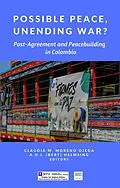After more than 50 years of internal armed conflict in Colombia, finally on November 24, 2016, a final Peace Agreement was reached with the world's oldest guerrillas, the FARC-EP. How is the process of implementation of the Final Agreement and the construction of a lasting peace going? How might we understand the Colombian case? What do international lessons say about rebuilding post-conflict societies? How do more than 50 years of war impact a society and its hopes for reconciliation? Is a comprehensive transition, the reincorporation of former combatants and the construction of conditions for development in the territories really achievable? What are the challenges that the country faces in the construction of peace, understood as a medium and long-term process? In this sense, how has Colombia transitioned from peacemaking to peacebuilding in the post-agreement period? How might we assess the progress and existing challenges in each of the agreed areas of the peace agreement? In response to these questions, this book contains the contributions of different experts and researchers from institutions such as the Institute of Social Studies of the University of Rotterdam, the Center for Research and Popular Education (CINEP) of Colombia and the New York University Peace Research and Education Program. This book is structured by proposing four thematic lines: rural development with a territorial approach and comprehensive rural reform; political participation and end of the conflict; victims, truth, justice, reparations and non-repetition; and cross-cutting peacebuilding issues. In a transversal way, it places special emphasis on the analysis of the territory, as the sustenance of the agreed peace. As a whole, the chapters address the complexity of the Peace Agreement as an integral opportunity for peacebuilding in the country. Their recommendations, based on the specialized literature and the critical analysis of the process to date, offer clues to be considered in order to make its results more profound and effective.
Autorentext
NYUpeace.education, @NYUpeace, www.cinep.org.co, https://www.iss.nl/en,
Inhalt
"Peace is Made in the Regions": Territorial Economic Development and the Implementation of the Peace Agreement in Colombia, Agrarian Issues and the Implementation of the Peace Agreement , Impossible Democratization? A Political Perspective of the Colombian Peace Agreement, The ELN in the Armed Territorial Reconfigurations in Times of Post-Agreement, Colombia: Antecedents and Demands for Truth, Justice, Reparation and Non-Repetition, The Role of Conflict Transformation Education in Building Community-led Peace: The case of RESURPAZ, The Transition between "Imperfect Peace" and "Peace with Legality": A Crisis of Political Representation of Society?
